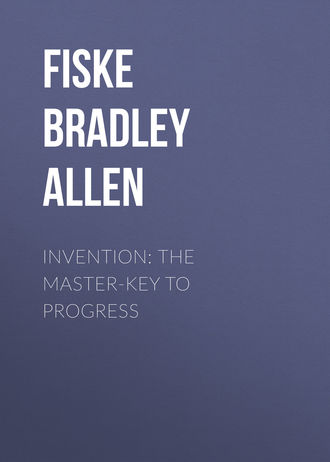 полная версия
полная версияInvention: The Master-key to Progress
And since the civilized world is in virtual agreement that civilization is a happier state than savagery, and since we have been impelled toward civilization by invention mainly, there seems no escape from the conclusion that it is to invention mainly that we must look for increase of happiness in the future.
It may be, of course, that happiness does not come so much from a condition or state attained as from the act of striving to attain it. It may be suggested also by some one that life is merely a game, and that happiness comes from playing the game and not from winning it, just as children delight more in constructing a toy building with their blocks than in the building when completed: for they no sooner complete the building than they knock it down, and begin to build it up again. But, even from this point of view, the desirability of fostering invention would be apparent; because it would continually supply us with new games to play, and new toys with which to play them.
But that any thoughtful person could really think life a game is an impossibility. No man with a mind to reason and a soul to feel can contemplate the awful suffering that has always existed in the world, and think life a mere game. No man can think life a mere game, who with an eye to see and an imagination to conceive, gazes upon the infinite sea of stars visible to his unaided vision, realizes how many thousands upon thousands of stars there are besides, that the photographic camera records, and realizes also that, though light travels even through air at a rate exceeding 186,000 miles per second, yet that some stars are so distant that the light now reaching us from them started ages before the dawn of history. And no man who is able to follow the teachings of science, even superficially, can note the enormous development of civilization during the last few thousand years, and realize that a development similar though infinitely grander, must have been going on in all the universe for countless centuries, without realizing also that "through the ages an increasing purpose runs." He may even note a likeness between it and the development on an infinitely smaller scale, of the conception of a merely human inventor. Possibly, his fancy may even soar still higher: possibly he may even wonder if all this great creation may not be in effect a great invention, and God its Great Creator, because its Great Inventor.
So, whether we fix our thought on what the scientists tell us of the probable course of development of the universe during the countless ages of the past, or consider merely the development of man since the dawn of recorded history, we seem to find as the initiating cause of both – invention.
Let us therefore utilize all means possible to develop this Godgiven faculty, the chiefest of the talents committed to our keeping. That way lie progress, prosperity and happiness. How far and how high it may lead us, God only knows; for the resources of invention are infinite.
The End
